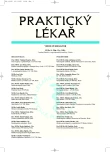Biochemical molecular mechanisms of heart failure (Part 2)
Biochemické molekulární mechanismy srdečního selhání 2. část
Článek je přehledem recentních poznatků o molekulární patobiochemii srdečního selhání. Autor podrobně popisuje roli poruch v beta-adrenergní signalizaci, význam systému renin – angiotensin – aldosteron, a natriuretických peptidů (ANP, BNP). Zvlášť uvádí možnosti laboratorní diagnostiky i pokroky v terapii srdečního selhání. Tento klinický syndrom se stoupajícím výskytem v populaci se stává stále naléhavějším zdravotnickým i sociálně ekonomickým problémem, který vyžaduje účinnou prevenci.
Klíčová slova:
srdeční selhání, molekulární biochemie, diagnostika a terapie
Authors:
J. Masopust
Authors‘ workplace:
Přednosta: doc. MUDr. Richard Průša, CSc.
; 2. lékařská fakulta
; Ústav klinické biochemie a patobiochemie
; Univerzita Karlova v Praze
Published in:
Prakt. Lék. 2007; 87(1): 26-31
Category:
Various Specialization
Overview
The article presents an overview of recent findings in the molecular pathobiochemistry of heart failure. In particular, the author describes a role for disturbances in beta-adrenergic signalisation, and the importance both of the renine-angiotensine-aldosterone system and of natriuretic peptides (ANP, BNP). In addition, new methods of laboratory diagnostics and advances in the treatment of heart failure are presented. With its increasing incidence in the population, this clinical syndrome is becoming a greater health and socio-economic problem, and one which requires effective prevention.
Key words:
heart failure, molecular biochemistry, diagnostics and therapy
Labels
General practitioner for children and adolescents General practitioner for adultsArticle was published in
General Practitioner

2007 Issue 1
- Advances in the Treatment of Myasthenia Gravis on the Horizon
- Hope Awakens with Early Diagnosis of Parkinson's Disease Based on Skin Odor
- Memantine in Dementia Therapy – Current Findings and Possible Future Applications
- Memantine Eases Daily Life for Patients and Caregivers
- Possibilities of Using Metamizole in the Treatment of Acute Primary Headaches
-
All articles in this issue
- Patent foramen ovale as a cause of paradoxical embolization in scuba divers. Screening possibilities, therapeutic and preventive recommendation.
- Hypoglycaemia-associated autonomic failure, its clinical assessment and treatment.
- Chronic renal failure in primary care
- Prescription of psychotropic drugs during pregnancy and breast-feeding in the general practitioner’s surgery.
- Wilson’s disease
- Diagnostics and treatment of rheumatoid arthritis – some new aspects
- Biochemical molecular mechanisms of heart failure (Part 2)
- Antimicrobial resistance in seven invasive bacterial species* monitored within EARSS in the Czech Republic (CR) from 2000 – 2006. (*Streptococcus pneumoniae, Staphylococcus aureus, Enterococcus faecalis, Enterococcus faecium, Escherichia coli, Klebsiella pneumoniae, Pseudomonas aeruginosa).
- Childhood injuries and their prevention
- Our experience with the treatment of acute mesenterial ischemia
- Craniopharyngioma in 79 years old man – a case study
- General Practitioner
- Journal archive
- Current issue
- About the journal
Most read in this issue
- Chronic renal failure in primary care
- Craniopharyngioma in 79 years old man – a case study
- Wilson’s disease
- Hypoglycaemia-associated autonomic failure, its clinical assessment and treatment.
